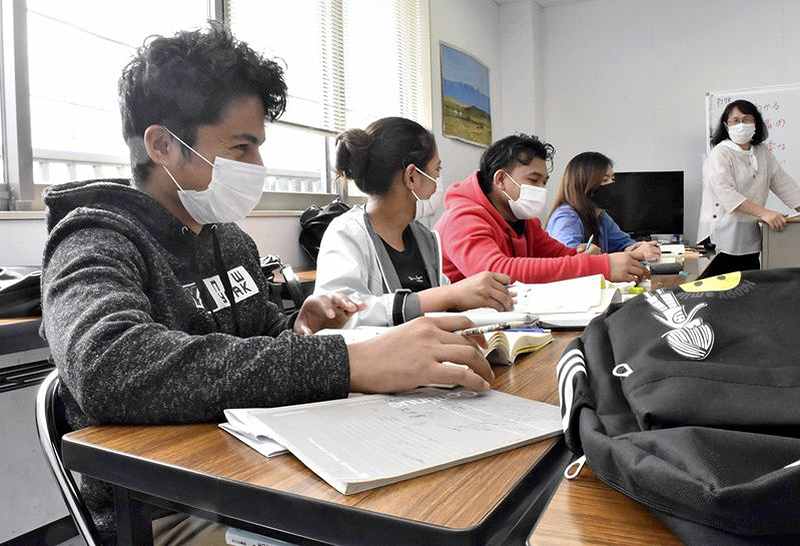
Foreign students study Japanese at a Japanese language school in Nishigo, Fukushima Prefecture, in September.
9:10 JST, December 15, 2021
To help people overseas who want but are unable to study in Japan, the Cultural Affairs Agency plans to enhance online Japanese lessons provided by language schools in Japan from 2022.
The agency will support language schools in creating appealing online lessons so people overseas who cannot enter Japan due to the COVID-19 pandemic can still study.
The agency aims to provide free lessons that can be taken overseas from about 400 schools, agency sources said.
Entry restrictions for foreigners were eased on Nov. 8.
However, the eased constraints ended up being temporary as the government banned all nonresident foreigners from entering Japan starting on Nov. 30 due to the global spread of the omicron variant of the coronavirus.
During the pandemic, a number of students overseas have given up on the idea of coming to Japan to study, or have looked to study in other countries.
The environment and curriculum for online Japanese lessons are not significantly developed in Japan, and only a limited number are offered for people overseas.
The agency will provide ¥4 million to ¥10 million to each school to help cover costs such as renting personal computers and other equipment, Japanese teacher training and the development of teaching materials.
The agency envisions that schools will offer different lessons tailored to the Japanese skills of each student, and group lessons in which students overseas are connected with foreign students in Japan to foster interaction.
The lessons will be free, and the agency hopes to convey the positive aspects of studying in Japan so people wanting to do so will not change to other countries or give up on the idea of studying in Japan.
The agency will collect and study examples of effective lessons and provide know-how about remote lessons to language schools nationwide.
The agency earmarked ¥4.1 billion in the fiscal 2021 supplementary budget proposal for this purpose, and about 400 of the nation’s 818 Japanese-language schools will be covered under the project.
In order for foreign students to be admitted to Japan’s universities or other institutions of higher learning, a person must pass the highest or second-highest level of the five-tier Japanese-Language Proficiency Test.
Foreign students often study at Japanese language schools for up to two years in a bid to pass the necessary level of the JLPT and other tests.
According to a fiscal 2019 survey by the Japanese Student Services Organization, 76% of graduates from Japanese-language schools proceeded to universities and other schools in Japan and 7% landed a job in the country.
Many who return home work as a bridge between their home country and Japan.
According to a survey jointly conducted over the summer by six organizations related to the teaching of Japanese, 6,154 people who had been admitted to a language school last year were still waiting to enter Japan.
The figure for people in the same situation this year stands at 15,877.
Top Articles in Politics
-

Japan PM Takaichi’s Cabinet Resigns en Masse
-

Sanae Takaichi Elected Prime Minister of Japan; Keeps All Cabinet Appointees from Previous Term
-

Japan’s Govt to Submit Road Map for Growth Strategy in March, PM Takaichi to Announce in Upcoming Policy Speech
-

LDP Wins Historic Landslide Victory
-

LDP Wins Landslide Victory, Secures Single-party Majority; Ruling Coalition with JIP Poised to Secure Over 300 seats (UPDATE 1)
JN ACCESS RANKING
-

Japan PM Takaichi’s Cabinet Resigns en Masse
-

Japan Institute to Use Domestic Commercial Optical Lattice Clock to Set Japan Standard Time
-

Israeli Ambassador to Japan Speaks about Japan’s Role in the Reconstruction of Gaza
-

Man Infected with Measles Reportedly Dined at Restaurant in Tokyo Station
-

Videos Plagiarized, Reposted with False Subtitles Claiming ‘Ryukyu Belongs to China’; Anti-China False Information Also Posted in Japan





















